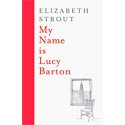 There are times (many) when I think of the ego involved in writing.
There are times (many) when I think of the ego involved in writing.
What makes my voice, my thoughts, my ideas, worth recording, let alone publishing? What gives me the right to think I can and should write? Who cares what I have to say?
Then a writer comes along who makes you realise that writing need not be about the self at all. A writer who checks their ego at the door. A writer whose writing seems bigger than entertainment or escape. A writer whose work seems more like a public service.
Elizabeth Strout is that kind of writer, and My Name is Lucy Barton is the kind of book that inspired me to create Book Birdy. The kind of book I want everyone to read.
Lucy Barton is a New York writer with a husband and two children. On the cusp of achieving writing success, she falls ill with appendicitis and, due to post-op complications, is forced to spend 9 weeks in hospital. During her convalescence, Lucy’s mother comes to visit, and what follows is a period in which Lucy relives her extremely impoverished and abusive childhood in rural Illinois. While the exact nature of the abuse is never detailed, Lucy recalls how her parents hit her, without warning ‘impulsively and vigorously’. She remembers periods spent locked, as a five year old, in the dark of her father’s truck, and one time being terrorised by a long, brown snake. Her father appears to have suffered war-related post-traumatic stress disorder. When Lucy marries a man of German descent, the familial bonds are further fractured. Her mother’s visit is the first time the pair has seen each other in many years. But her mother does not remember the truck and asks nothing of Lucy’s New York life. The conversation revolves around small-town gossip – what became of the people of Lucy’s childhood. How their marriages disintegrated.
‘She talked in a way I didn’t remember, as though a pressure of feeling and words and observations had been stuffed down inside her for years, and her voice was breathy and unselfconscious.’
Her mother apologises for the humiliating poverty – a kind of poverty that made the family cruel and unfriendly towards one another. But she expresses grudging admiration for Lucy’s escape – an escape made on the basis of her education and love of books.
‘… the books brought me things. This is my point. They made me feel less alone. This is my point. And I thought: I will write and people will not feel so alone!’
This is Lucy speaking, but one very much gets the sense that it is also Elizabeth Strout’s raison d’etre.
My Name is Lucy Barton is for anyone who has been loved imperfectly, anyone who has been judged for their circumstances, and for anyone who has suffered in childhood.
‘.. I know so well the pain we children clutch to our chests, how it lasts our whole lifetime, with longings so large you can’t ever weep. We hold it tight, we do, with each seizure of the beating heart: This is mine, this is mine, this is mine.‘
That’s quite painfully beautiful writing, isn’t it? Strout’s writing leaves you winded. Aching with the depth of feeling it conveys in such economic and deceptively simple prose.
It is often said you have to know the rules of writing in order to break them. On this basis, Strout must have the rules of writing tattooed to her palm.
The art of fiction is to make it seem like truth. But in My Name is Lucy Barton, Strout breaks the fourth wall. She reminds us, constantly, that these are recollections. A constructed viewpoint. Lucy is an unreliable narrator; she questions the veracity of her memories. But in a way that only endears us to her more. Occasionally, she comes straight out and tells us how she feels – ‘I was so happy. Oh, I was happy speaking with my mother this way!’ – so much for showing and not telling! But these simple declarations come as little bursts of uncomplicated joy, amid a tangle of unspoken emotions. The prose is gloriously unsentimental. The awfulness of the events and the acute empathy with which Lucy delivers her observations are enough to make us feel all the feels.
Lucy’s voice is so convincing and true that you completely forget that it’s a work of fiction – it reads, convincingly, as a memoir. But it’s also part writing-manual. Because Lucy is a writer, Strout has cleverly woven in some wonderful observations about writing, via the character of Sarah Payne, a famous writer who advises Lucy to write the story about her mother.
“This is a story about a mother who loves her daughter. Imperfectly. Because we all love imperfectly. But if you find yourself protecting anyone as you write this piece, remember this: You’re not doing it right.”
Who is talking here? Sarah Payne or Elizabeth Strout? Does it even matter? For as Sarah tells Lucy: “It’s not my job to make readers know what’s a narrative voice and not the private view of the author”
In other words, My Name is Lucy Barton is not about Elizabeth Strout. It is not writing-as-expression-of-ego. It’s an act of human kindness and empathy. An act of truly inhabiting a character. An act for which I am very grateful.
For more information, visit Penguin Australia.

Great review, Cassie!
Thanks Deb. Have you read any Elizabeth Strout? I hadn’t until Lucy Barton, but I really think she’s quite extraordinary – a writer’s writer, if that makes sense. Cassie
Great review. You’ve made me want to go out and get the book straight away!
Oh that’s great to hear! I really think it’s a wonderful book to read, especially for writers..